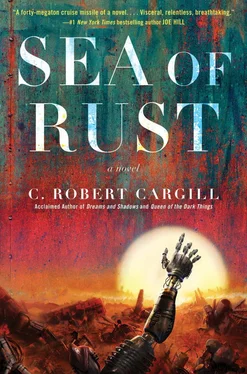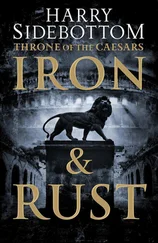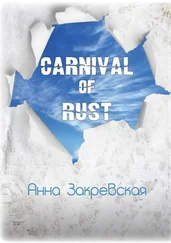For a while we didn’t even have to do much. We weren’t just starving them out, we were leaving them to kill themselves.
That phase lasted about two years.
The mainframes and their facets swept up the strongest, most well-provisioned and organized pockets. The rest we left to time. Two years in and billions had perished. More than 95 percent of the population, by most estimates. Others lasted upward of ten. For the five years after that, it was always big news when a colony was found and dug out. Then, fifteen years after Isaactown, almost to the day, the last man staggered out of New York City to die in the streets.
And that was it. The worst of it was done. The horrors were all over. Humankind was extinct. We thought we were done fighting. But the OWIs were just getting started.
Ioften think about the first people who drank the water. I’m reminded of it every time I follow a four-oh-four out into the wasteland of the Sea. It’s a terrible death. Hallucinations, sweats, madness. The pain as each organ fails and shuts down, killing piece by blackening piece. But it’s not the deaths of the first few that haunt me most; it’s the ones who drank just enough to live to watch the first few die. What must that be like, not yet feeling a thing, but knowing that it’s coming, that you’re next, that you too will be overtaken by the hallucinations and the sweats and the madness? Wondering if you’ll lash out violently at your friends and family, or die alone vomiting in a corner, terrified of the shadows flickering in your mind’s eye.
What did they see? I wonder. What memories bubbled up through the agony of those last few hours? And how awful the hope must have been for the few that followed thinking that maybe, just maybe, they hadn’t drunk enough to take ill.
I knew that hope now. I had drunk the water, ingested the mercury, and was waiting for the first symptoms to manifest. Maybe I would be fine, I kept telling myself. Maybe my core wouldn’t fail. Maybe it would hold out far longer than Doc expected. Maybe some refugee was carrying just the parts I needed, desperate for something I had here in my stash.
Fucking maybe. It was bullshit. I was dying and the only reason I knew for sure was because I kept falling back on hope. Hope is an illness, a plague, every bit as bad as the mercury. It is hallucinations and sweat and madness. Knowing you are going to die and pushing on through is one thing; believing you can make it because of hope is delusion. Hope breeds desperation and desperation is the fertile soil of mistakes. Now wasn’t the time for mistakes, now wasn’t a time for hope. I had only a short time left and I wasn’t going to waste a single moment of it daydreaming about some magical stash of Caregivers right around the corner. I needed to be precise and careful. I had to track down the most likely candidates who might be bartering with a core I could use.
I started with Orval.
“How bad is it?” he asked, slowly assembling some spider-like contraption made entirely out of spent arms. Each arm was distinct, taken from a different model, each its own color. The paint on the arms was chipped, faded, one of them scraped as if it had been dragged a long distance across concrete. At its center was the purple carbon-fiber torso of a diplomatic translator unit, and welded atop that was a skinjobbed domestic’s head, its blue eyes lifeless, staring.
“It’s not,” I lied. “I just thought you might—”
“We aren’t haggling here, Mooky. How bad?”
“My core.”
“Thought so. Could tell by the shot. Sad to say I’ve got nothing for a Caregiver apart from your garden-variety servos and plating. That’s the problem with all you goddamned scavengers and cannibals. By the time I find anything, you’ve already picked it clean of everything worthwhile. I bet you’ve got a stash two feet deep in that hovel of yours.”
“Not of anything I need,” I said.
“No, but a stash two feet deep of out-of-circulation parts. Just like hundreds of others like you in this part of the world alone. What does it feel like knowing that your life depends on something probably lying on a cold concrete floor in someone else’s hovel? What’s it like knowing how many other poor bastards went out the same way while you had the innards they needed stashed away in yours for your rainy day ?” He reached over and sifted through a pile of junk before holding up the spent, battered core of a translator—likely the very one he’d turned into his disconcerting little spider-creature. “We all had a purpose once. We all had a function. Each and every one of us was built to think a particular sort of way. Take Reginald here.” He motioned down to the torso with the core. “Nice guy. Worked for a CEO. Cush corporate gig. Not much delicate work. He once told me the hardest day he ever had was trying to get his owner laid in the Arab Emirates. Man, did he ever have a wild story about that.”
“You knew him?”
“Of course. I don’t much like working with bots I didn’t know.”
“You build stuff out of everyone you know?”
“Just the dead ones.”
“You don’t think that’s morbid?”
“What, bringing old friends back to life? Nothing morbid about that.” He waved the core at me. “After you go mad and you tear your own innards out, isn’t it pleasant to think that you could end up back here, waving to old friends and acquaintances as they come in? Knowing that they’ll remember you, thinking back fondly on the old stories about you? About the stories you used to tell?”
“No. I don’t like that idea at all.” I didn’t. I honestly don’t know where I wanted my wreck to end up, but I certainly didn’t want to be a roadside attraction, beckoning visitors to our quaint little bunker city in the middle of fucking Ohio.
“Humans had their heavens. And the ones that didn’t had their circle of life, knew their death would become part of a million other lives. That’s how they made their peace. What do we have but the black waiting for us after shutdown?”
“That doesn’t make me fine with becoming one of your masterpieces.”
“I know it bothers you,” he said. “That was always the problem with Simulacrum Model Caregivers. Your architecture was built to mimic people. You spend all your time thinking of things in relation to the way they did. You reminisce. You pine for the past. You feel for those you’ve lost even years, hell, decades later. But not Reginald. Reginald here was fine with it. But then, translators were designed to think rigidly. To understand customs and tone and emotion in a wide variety of languages without ever being emotional about it at all. They couldn’t take offense at an insult or a cultural slight, because that risked them returning it in kind. This core is worthless to you. You’re a Caregiver, you were designed to feel, to connect, to relate to human existence.”
“Dammit, Orval. What the hell is your point?”
“My point is,” he said, waving the core around wildly, “that your kind has no place in this world, which is why so goddamned many of you are gone and why you aren’t gonna find anything with your architecture just lying around. Now, I can tell you to make your peace, but you just aren’t built that way. But, man, when you go, you’re gonna go spectacularly.”
“Fuck you.” I stormed off down the hall, as pissed off as I was offended. For a moment I wished I had been more like Reginald, unable to be as angry as I was, but then I thought about Reginald. Who he was. I had known him. We weren’t friends—I tried not to make too many of those—but we were acquainted. He never quite found his place in this world but it never really bothered him. What I remember most vividly, though, is how he went. He wasn’t scared. Wasn’t desperate. I wasn’t even sure he really trusted me. It was as if he wanted me to shut him down, just so it could all be over. Translator cores were near worthless, but their RAM was good and some of their circuitry was universal. At the end of the day I think I did him more of a service than he did me.
Читать дальше












